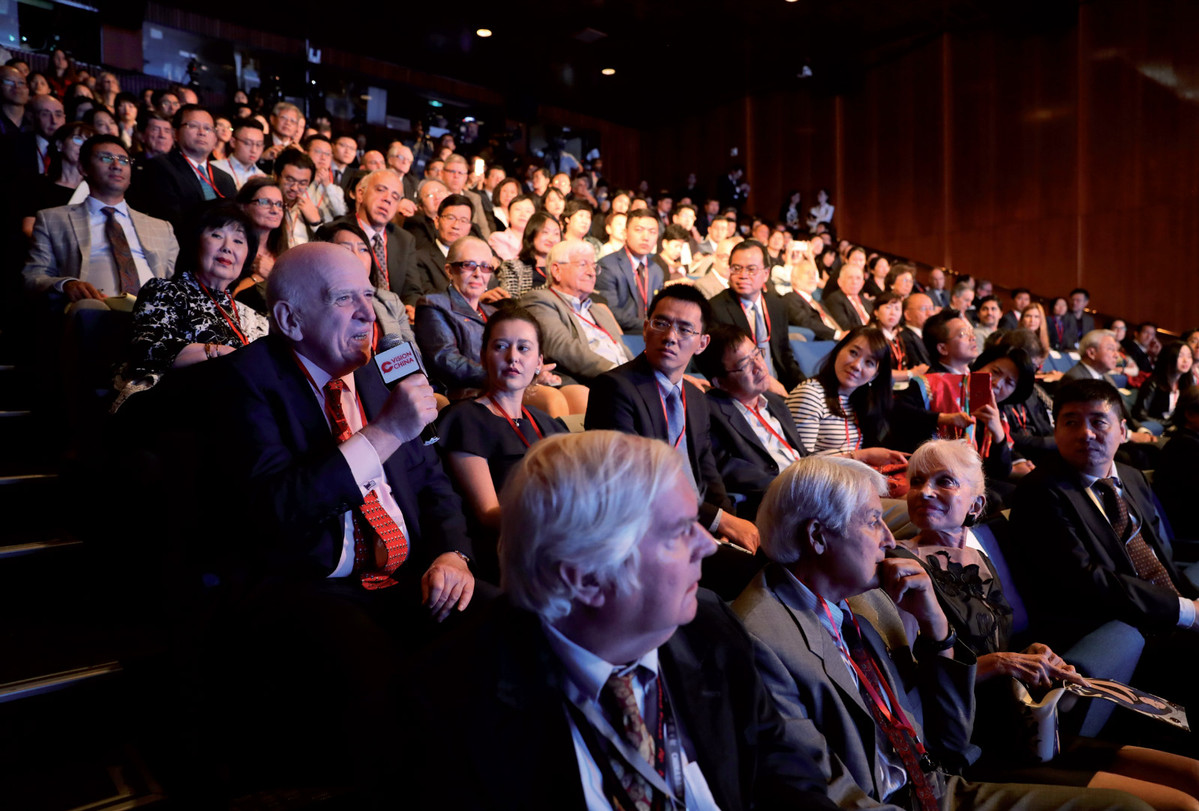Humorous and serious stories of China-US relations shared
By WILLIAM HENNELLY in New York | China Daily Global | Updated: 2019-09-20 03:19

How many Americans can say they've shaken hands with President Xi Jinping — and with his father?
That was one of the anecdotes offered by the speakers at a Vision China event in New York on Tuesday. The distinguished guests enlightened the 300-strong diverse audience at the Asia Society, who turned out to hear the topics discussed at "China-US Relations: 40 Years & Beyond".
Kenneth Quinn, now president of the World Food Prize Foundation in Iowa, joked about a mistake on a graphic posted on the stage's video screen that said in 2012, with the signing of the US-China Strategic Cooperation Agreement in Agriculture, China would buy $3.5 million in Iowa soybeans. The number should have said $3.5 billion.
"I have to text my special assistant. That's what maybe we get today," Quinn deadpanned, to much audience laughter, referring to the dropoff of soybean exports to China during the current trade dispute.
Quinn got to escort Xi Jinping, who was vice-president at the time, to the World Food Prize Hall of Laureates in Des Moines, Iowa, for the agricultural agreement signing. Xi also had been on a "sentimental" return trip to Iowa, which he first visited in 1985.
"By the way, I just shook your hand, and I'm one of the few Iowans to shake your hand who also shook your father's hand when your father came to Iowa in 1980," Quinn said to Xi through an interpreter.
"So, Vice-President Xi is walking along. He literally stops in his tracks and he turns and looks at me, and his eyes get big, and a big smile comes across his face and he says, 'You have two interesting stories.'"
Quinn then proceeded to tell the first interesting story, when the then-governor of Guangdong province, Xi Zhongxun (father of now President Xi Jinping), arrived in October 1980, where the province and Iowa made a toast to "future trade and friendship". At the time, Iowa had zero agriculture sales to China.
After taking the elder Xi to see various sights around Iowa, "We ended up on the second day stopping at the Amana colonies," Quinn said.
The colonies were started by German immigrants in the 19th century.
"It was a total communist society," Quinn said. "It was organized exactly the same as any Chinese village and commune. He (Xi Zhongxun) could not stop asking questions about it.
"Because in China at that time was this discussion. He was about to start the Shenzhen special zone for manufacturing. Could agriculture be put on a free market basis in China, could it be socialism with Chinese characteristics?" Quinn said.
"Whatever he took away, they went back, and with Deng Xiaoping, Xi Zhongxun began the incredible transformation of China."
The gregarious Quinn also proudly displayed a photo of his 4-year-old granddaughter, who is of Irish and Chinese descent.
Other guest speakers included Connie Sweeris, who along with her husband, Dell, played a key role in the "ping-pong diplomacy" of the 1970s between the two nations.
In April 1971, she traveled to China just shy of her 24th birthday on a historic trip by a nine-member US table tennis team.
There, team members got to meet then-premier Zhou Enlai.
"What a joy it is to bring friends from afar," Zhou told the team.
"Every place we went we were served eight-to-10 course banquet meals," Sweeris recounted Tuesday of the hosts' hospitality.
Besides the lighter moments, there were some serious ones, such as the current trade standoff between the US and China. (Incidentally, that issue will be addressed once more on Thursday, with a round of talks in Washington, to be followed by high-level talks in October.)
Economist Stephen Roach, a leading Wall Street expert on China, explained in simple terms why the current approach to US-China trade disagreements needs to be rethought.
"I think we need to be much more creative in our negotiating tactics," said Roach, who is senior fellow at the Yale University Jackson Institute of Global Affairs. "I'm looking for macroeconomic adjustments in both countries, where we save more and China saves less."
On a video screen behind Roach was a timeline of the various starts and stops to the trade negotiations over the past year and a half, over who wants a deal and who doesn't.
Maurice Greenberg, chairman of the Starr Companies, said: "It's time that we have an agreement. I believe it's possible. If both sides can't do it, then both sides will suffer. I'm convinced of that."
And the only person on the stage sprinkling in any Mandarin was an American, Max Horne, an avid student of Chinese language and culture. A freshman at Harvard University, Horne was the champion of the 2018 Chinese Bridge Speech Contest for US high school students. He and China Daily's Dong Leshuo cheerfully served as the emcees of the event.
























